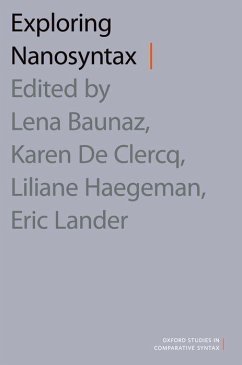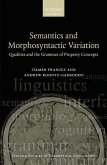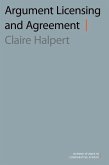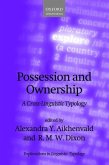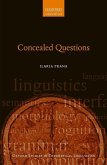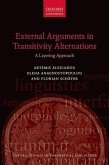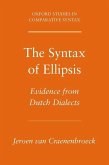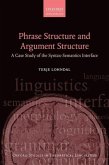Exploring Nanosyntax
Herausgeber: Baunaz, Lena; Lander, Eric; de Clercq, Karen; Haegeman, Liliane
Exploring Nanosyntax
Herausgeber: Baunaz, Lena; Lander, Eric; de Clercq, Karen; Haegeman, Liliane
- Broschiertes Buch
- Merkliste
- Auf die Merkliste
- Bewerten Bewerten
- Teilen
- Produkt teilen
- Produkterinnerung
- Produkterinnerung
By offering the first in-depth introduction to the framework of nanosyntax, Exploring Nanosyntax fills a major gap in current theoretical literature. The volume contains original contributions by senior and junior researchers in the field and will also constitute an ideal handbook for advanced students and researchers in linguistics.
Andere Kunden interessierten sich auch für
![Semantics and Morphosyntactic Variation: Qualities and the Grammar of Property Concepts Semantics and Morphosyntactic Variation: Qualities and the Grammar of Property Concepts]() Itamar FrancezSemantics and Morphosyntactic Variation: Qualities and the Grammar of Property Concepts52,99 €
Itamar FrancezSemantics and Morphosyntactic Variation: Qualities and the Grammar of Property Concepts52,99 €![Argument Licensing and Agreement Argument Licensing and Agreement]() Claire HalpertArgument Licensing and Agreement54,99 €
Claire HalpertArgument Licensing and Agreement54,99 €![Possession and Ownership: A Cross-Linguistic Typology Possession and Ownership: A Cross-Linguistic Typology]() Possession and Ownership: A Cross-Linguistic Typology61,99 €
Possession and Ownership: A Cross-Linguistic Typology61,99 €![Concealed Questions Concealed Questions]() Ilaria FranaConcealed Questions51,99 €
Ilaria FranaConcealed Questions51,99 €![External Arguments in Transitivity Alternations: A Layering Approach External Arguments in Transitivity Alternations: A Layering Approach]() Artemis AlexiadouExternal Arguments in Transitivity Alternations: A Layering Approach63,99 €
Artemis AlexiadouExternal Arguments in Transitivity Alternations: A Layering Approach63,99 €![Syntax of Ellipsis Syntax of Ellipsis]() Jeroen Van CraenenbroeckSyntax of Ellipsis60,99 €
Jeroen Van CraenenbroeckSyntax of Ellipsis60,99 €![Phrase Structure and Argument Structure: A Case Study of the Syntax-Semantics Interface Phrase Structure and Argument Structure: A Case Study of the Syntax-Semantics Interface]() Terje LohndalPhrase Structure and Argument Structure: A Case Study of the Syntax-Semantics Interface60,99 €
Terje LohndalPhrase Structure and Argument Structure: A Case Study of the Syntax-Semantics Interface60,99 €-
-
-
By offering the first in-depth introduction to the framework of nanosyntax, Exploring Nanosyntax fills a major gap in current theoretical literature. The volume contains original contributions by senior and junior researchers in the field and will also constitute an ideal handbook for advanced students and researchers in linguistics.
Produktdetails
- Produktdetails
- Verlag: Sydney University Press
- Seitenzahl: 360
- Erscheinungstermin: 1. Juni 2018
- Englisch
- Abmessung: 231mm x 155mm x 23mm
- Gewicht: 522g
- ISBN-13: 9780190876753
- ISBN-10: 0190876751
- Artikelnr.: 50085736
- Verlag: Sydney University Press
- Seitenzahl: 360
- Erscheinungstermin: 1. Juni 2018
- Englisch
- Abmessung: 231mm x 155mm x 23mm
- Gewicht: 522g
- ISBN-13: 9780190876753
- ISBN-10: 0190876751
- Artikelnr.: 50085736
Lena Baunaz is a postdoctoral assistant at the University of Zurich. She holds a PhD from the University of Geneva, which she published as The Grammar of French Quantification (Springer, 2011). Her recent research interests include the nano-syntax of the subjunctive mood, complementizers, and ontological categories. She has published in Probus, Studia Linguistica and others. Liliane Haegeman was professor of English Linguistics at the University of Geneva (Switzerland) from 1984-1999. Between 2000 and 2009 she was full professor of English linguistics at the University of Lille III. Since 2009 she has held a research position at Ghent University. She has worked extensively on the syntax of English and Flemish. Karen De Clercq is a postdoctoral researcher funded by the FWO and working at Ghent University. She wrote her PhD on the nanosyntax of negative markers under the supervision of Prof. Liliane Haegeman. She is currently working on the fine-grained morpho-syntax of Quantity-words (many/much; few/little), adjectives, degree comparison, and negation. Eric Lander is a postdoctoral researcher at the University of Gothenburg, currently working on negation in the history of Scandinavian. His research interests include Germanic philology, the NP/DP parameter, demonstratives, complementizers, and ontological categories. He has earned degrees from Harvard, Leuven, and Ghent.
* Contributors
* Preface
* PART I: Background
* 1. Nanosyntax: The Basics,
* Lena Baunaz and Eric Lander
* 2. Notes on Insertion in Distributed Morphology and Nanosyntax,
* Pavel Caha
* 3. Spanning vs. Constituent Lexicalization: The Case of Portmanteau
Prefixes,
* Tarald Taraldsen
* PART II: Empirical Investigations
* 4. A Note on Kim's Korean Question Particles Seen as Pronouns,
* Michal Starke
* 5. Syncretism and Containment in Spatial Deixis,
* Eric Lander and Liliane Haegeman
* 6. Decomposing Complementizers : The fseq of French, Modern Greek,
Serbo-Croatian and Bulgarian Complementizers,
* Lena Baunaz
* 7. Syncretisms and the Morphosyntax of Negation,
* Karen De Clercq
* 8. The Nanosyntax of Russian Verbal Prefixes,
* Inna Tolskaya
* PART III: Theoretical Explorations
* 9. Complex Left Branches, Spellout, and Prefixes,
* Michal Starke
* 10. Word Order and Nanosyntax: Preverbal Subjects and Interrogatives
across Spanish Varieties,
* Antonio Fábregas
* 11. The Feature Structure of Pronouns: A Probe into Multidimensional
Paradigms,
* Guido Vanden Wyngaerd
* >T>N Participles,
* Lucie Taraldsen Medová and Bartosz Wiland
* Glossary
* Index
* Preface
* PART I: Background
* 1. Nanosyntax: The Basics,
* Lena Baunaz and Eric Lander
* 2. Notes on Insertion in Distributed Morphology and Nanosyntax,
* Pavel Caha
* 3. Spanning vs. Constituent Lexicalization: The Case of Portmanteau
Prefixes,
* Tarald Taraldsen
* PART II: Empirical Investigations
* 4. A Note on Kim's Korean Question Particles Seen as Pronouns,
* Michal Starke
* 5. Syncretism and Containment in Spatial Deixis,
* Eric Lander and Liliane Haegeman
* 6. Decomposing Complementizers : The fseq of French, Modern Greek,
Serbo-Croatian and Bulgarian Complementizers,
* Lena Baunaz
* 7. Syncretisms and the Morphosyntax of Negation,
* Karen De Clercq
* 8. The Nanosyntax of Russian Verbal Prefixes,
* Inna Tolskaya
* PART III: Theoretical Explorations
* 9. Complex Left Branches, Spellout, and Prefixes,
* Michal Starke
* 10. Word Order and Nanosyntax: Preverbal Subjects and Interrogatives
across Spanish Varieties,
* Antonio Fábregas
* 11. The Feature Structure of Pronouns: A Probe into Multidimensional
Paradigms,
* Guido Vanden Wyngaerd
* >T>N Participles,
* Lucie Taraldsen Medová and Bartosz Wiland
* Glossary
* Index
* Contributors
* Preface
* PART I: Background
* 1. Nanosyntax: The Basics,
* Lena Baunaz and Eric Lander
* 2. Notes on Insertion in Distributed Morphology and Nanosyntax,
* Pavel Caha
* 3. Spanning vs. Constituent Lexicalization: The Case of Portmanteau
Prefixes,
* Tarald Taraldsen
* PART II: Empirical Investigations
* 4. A Note on Kim's Korean Question Particles Seen as Pronouns,
* Michal Starke
* 5. Syncretism and Containment in Spatial Deixis,
* Eric Lander and Liliane Haegeman
* 6. Decomposing Complementizers : The fseq of French, Modern Greek,
Serbo-Croatian and Bulgarian Complementizers,
* Lena Baunaz
* 7. Syncretisms and the Morphosyntax of Negation,
* Karen De Clercq
* 8. The Nanosyntax of Russian Verbal Prefixes,
* Inna Tolskaya
* PART III: Theoretical Explorations
* 9. Complex Left Branches, Spellout, and Prefixes,
* Michal Starke
* 10. Word Order and Nanosyntax: Preverbal Subjects and Interrogatives
across Spanish Varieties,
* Antonio Fábregas
* 11. The Feature Structure of Pronouns: A Probe into Multidimensional
Paradigms,
* Guido Vanden Wyngaerd
* >T>N Participles,
* Lucie Taraldsen Medová and Bartosz Wiland
* Glossary
* Index
* Preface
* PART I: Background
* 1. Nanosyntax: The Basics,
* Lena Baunaz and Eric Lander
* 2. Notes on Insertion in Distributed Morphology and Nanosyntax,
* Pavel Caha
* 3. Spanning vs. Constituent Lexicalization: The Case of Portmanteau
Prefixes,
* Tarald Taraldsen
* PART II: Empirical Investigations
* 4. A Note on Kim's Korean Question Particles Seen as Pronouns,
* Michal Starke
* 5. Syncretism and Containment in Spatial Deixis,
* Eric Lander and Liliane Haegeman
* 6. Decomposing Complementizers : The fseq of French, Modern Greek,
Serbo-Croatian and Bulgarian Complementizers,
* Lena Baunaz
* 7. Syncretisms and the Morphosyntax of Negation,
* Karen De Clercq
* 8. The Nanosyntax of Russian Verbal Prefixes,
* Inna Tolskaya
* PART III: Theoretical Explorations
* 9. Complex Left Branches, Spellout, and Prefixes,
* Michal Starke
* 10. Word Order and Nanosyntax: Preverbal Subjects and Interrogatives
across Spanish Varieties,
* Antonio Fábregas
* 11. The Feature Structure of Pronouns: A Probe into Multidimensional
Paradigms,
* Guido Vanden Wyngaerd
* >T>N Participles,
* Lucie Taraldsen Medová and Bartosz Wiland
* Glossary
* Index

